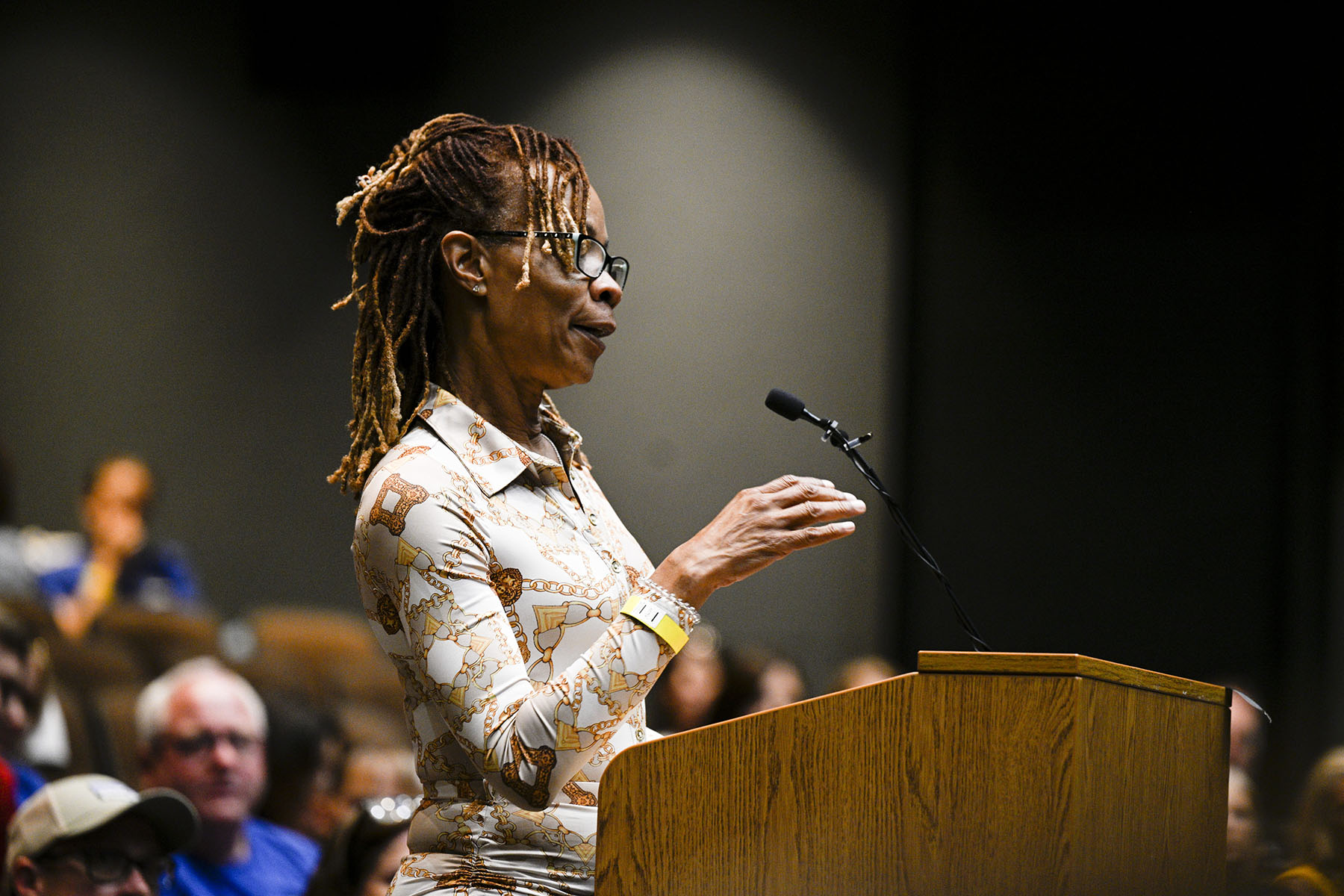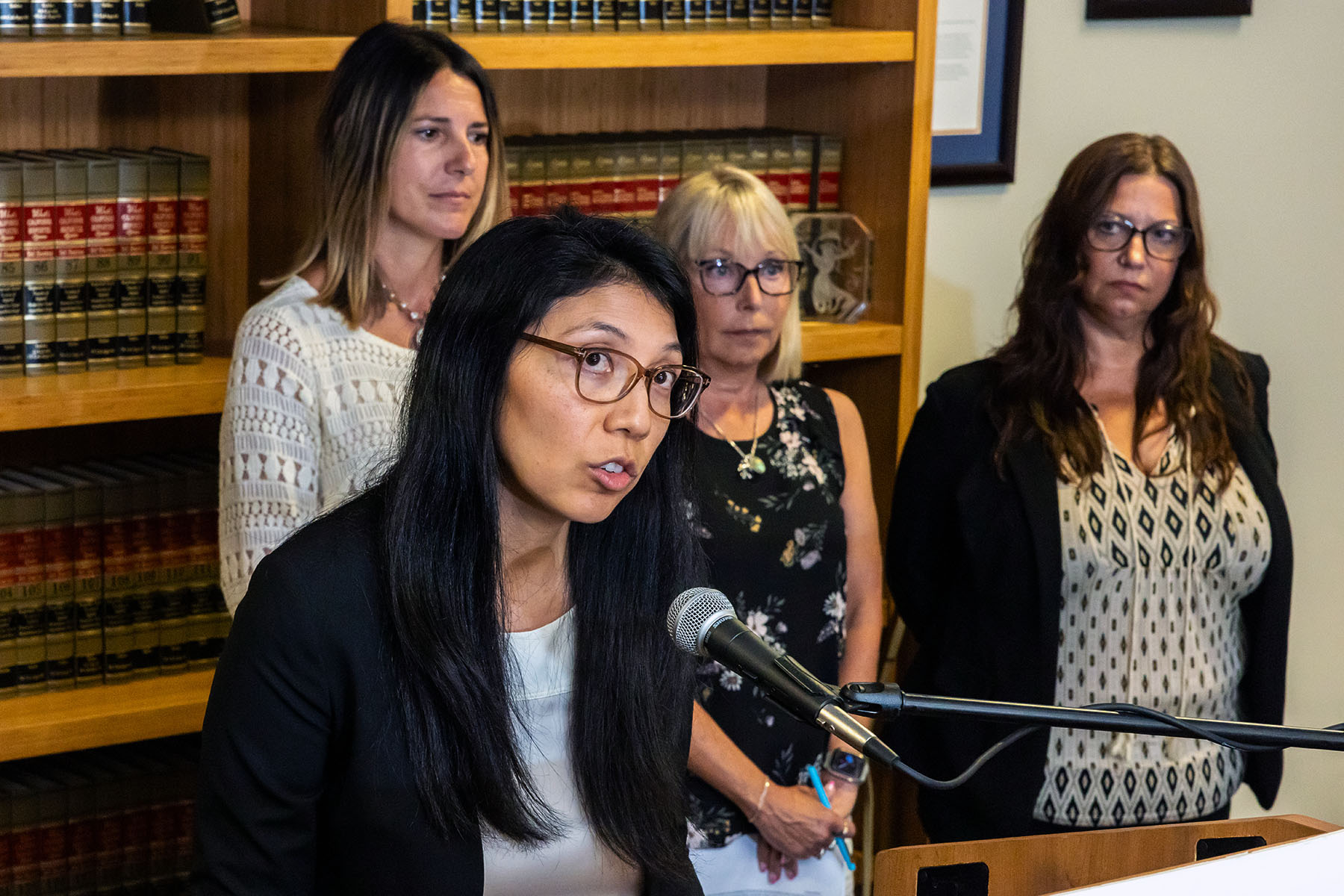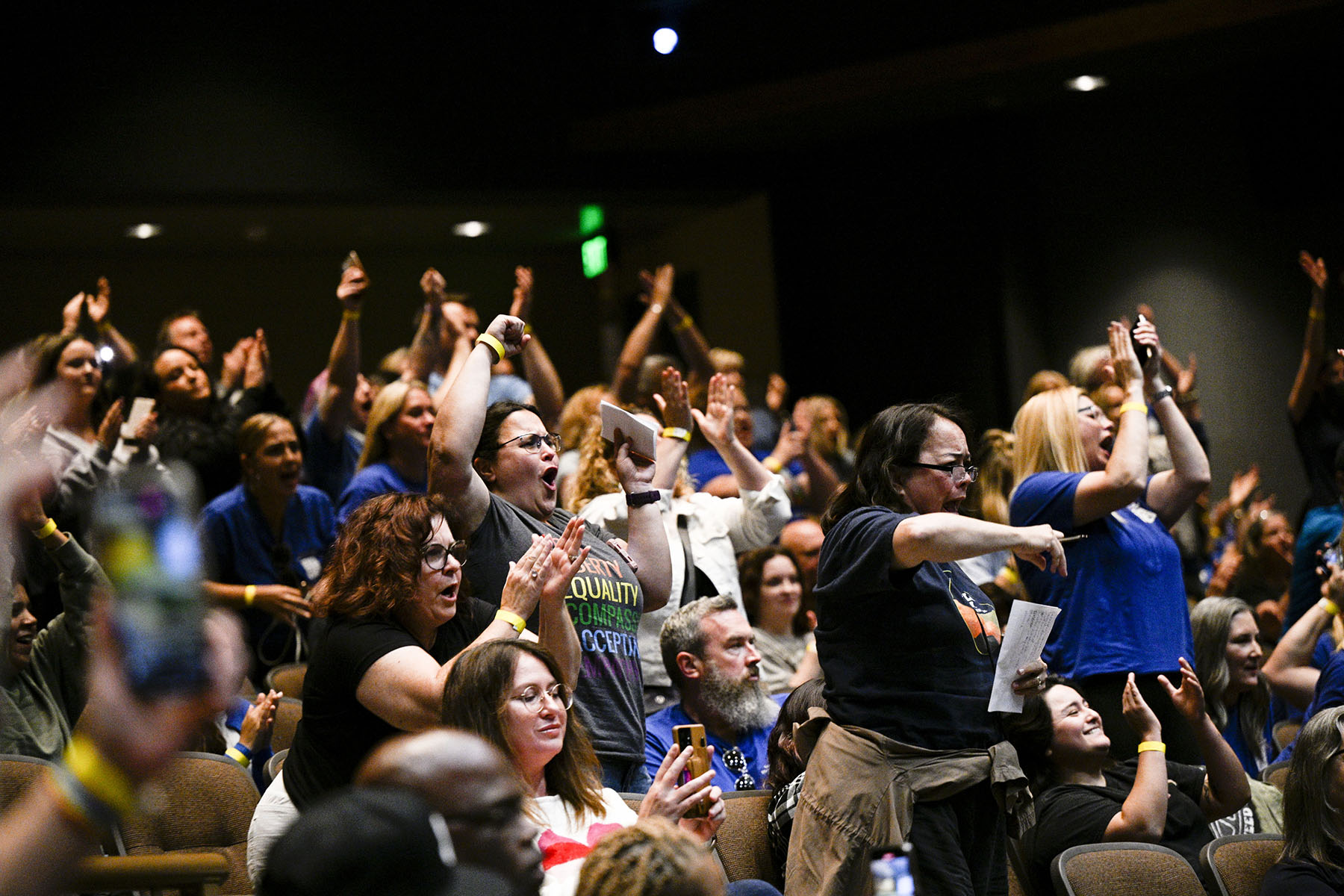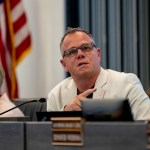At The 19th, we’re committed to publishing journalism that you can trust throughout the critical moments that shape our democracy and our lives. Show your support during our Fall Member Drive, and your donation will be matched. Double your gift today.
When Monica La Combe first moved to Temecula, she gave little thought to the school system in the Southern California city 60 miles north of San Diego.
“We didn’t know anything about the schools,” said La Combe, now a 22-year Temecula resident. “We bought the house because it was an affordable place to live. We paid into the school district for, like, 10 years before we could even access any of their services.”
Over the past year, the schools have become top of mind for La Combe, a mother of two and president of EnACT Temecula, a group of Black moms and educators advocating for inclusive learning environments. In November 2022, three conservative candidates — Joseph Komrosky, Danny Gonzalez and Jen Wiersma — won seats on the five-member governing board for the Temecula Valley Unified School District (TVUSD) with the help of evangelical pastor Tim Thompson’s Inland Empire Family PAC. Since then, the conservative majority has prohibited the teaching of critical race theory, briefly banned a social studies curriculum for mentioning gay trailblazer Harvey Milk, passed a gender identity disclosure policy and ousted the district’s woman superintendent.
Now, facing a Friday deadline, a coalition of activist groups has banded together to collect the signatures needed — 20 percent of registered voters in each trustee area — to prompt a recall election of the conservative board members. That coalition includes EnACT as well as Grandparents for Truth, which fights for young people’s freedom to learn, and One Temecula Valley, a political action committee formed largely to counter extremism in civic life.
Women — mothers, grandmothers, current and retired teachers — are leaders and founders of the organizations working for a recall and a school district that reflects the community’s diversity. With a population of almost 112,000, Temecula is half white, 30 percent Latinx, 11 percent Asian American and about 4 percent Black, according to census data. Yet, all but one of the five board members is White and two are women. In addition to the recall push, women are participating in legal actions to block the school district from enforcing policies that entail censorship or target marginalized youth.
These efforts come as candidates backed by Moms for Liberty, the parental rights group that backs policies similar to those recently greenlit by the Temecula school board, lost elections last month in states including Iowa, Pennsylvania, Virginia and Minnesota. The disappointing finishes for these candidates underscores the research indicating that most parents do not support censorship or curriculum oversight policies.
La Combe is one such parent. “I feel like they’re trying to roll back all of the progress that our country made in one fell swoop, and they say they’re starting with the school boards,” she said.
“You don’t get to come in and disrupt what we have as far as who we are as a community, and that’s what this board is doing.”
The hard right turn of a school board in a blue stronghold state has garnered headlines across the country. Footage of a Black parent being ejected from a heated Temecula school board meeting in the spring racked up tens of thousands of online page views. Gov. Gavin Newsom took to X, formerly Twitter, to warn the school board that its policies may violate state law and to criticize its president, Komorsky, for calling Harvey Milk a “pedophile.” In September, Newsom signed legislation to prohibit censorship of instructional materials and reinforce state law mandating that schools use textbooks representative of the state’s diversity.
“From Temecula to Tallahassee, fringe ideologues across the country are attempting to whitewash history and ban books from schools,” Newsom said then. “With this new law, we’re cementing California’s role as the true freedom state: a place where families — not political fanatics — have the freedom to decide what’s right for them.”

La Combe is the mother of a 12th grader and another teen who graduated from high school in 2022. In Temecula — known as a winery hub and as pop star Olivia Rodrigo’s hometown — her sons have had a childhood that’s idyllic compared with her early years in a Bronx, New York, housing project with a drug-addicted mother, La Combe said. But the changes to the school board have made families like hers feel unwelcome in a town where they are already part of a small minority. As a parent who’s openly criticized the school board and as president of EnACT, La Combe said that she’s faced intimidation, including social media harassment and unfamiliar cars beaming their headlights into her home.
Dianne Cox, an education specialist at Chaparral High School in Temecula, said that she’s also been targeted. Cox began EnACT in 2020 after the Memorial Day police murder of George Floyd in Minneapolis. The racial reckoning that followed Floyd’s killing led to discussions about equity access and inclusion in the nation’s schools, and EnACT was Cox’s way of making sure TVUSD did not overlook the needs of Black students. At the time, she said, the district had proclaimed that Black Lives Matter and that it did not tolerate racism. Through EnACT, she wanted to measure, in concrete ways, how the district served students of color and supported their success.
“Don’t just talk the talk, walk the walk,” she said. “So a group of other Black educators who happened to be parents as well in the district all got together at my house and I said, ‘Hey, let’s start a group to hold the school board accountable.’”
But it was difficult to keep the group’s momentum going as the COVID-19 pandemic kept schools closed for a year. When classrooms reopened in 2021, interest in EnACT had fizzled, Cox said. Then conservatives, buoyed by opponents of mask mandates, gained control of the school board, and La Combe insisted that Cox revive the group. Having started the first Black Student Union and African American Parent Advisory Council at her school, Cox was also hearing concerns about the school board’s conservative majority from other Black parents and students. Some of these community members expressed interest in recalling Komrosky, Wiersma and Gonzalez and started a dialogue about how to proceed with the One Temecula Valley PAC.
Cox supports a recall because she believes the new board members are “terrible at governance,” she said. “They don’t understand the protocol. They don’t do their research.” Some of them, she suspects, are solely on the board for publicity. Komrosky and Wiersma have both appeared on Fox News. Neither they nor Gonzalez responded to The 19th’s request for comment before publication.
The board’s contention that Temecula schools teach critical race theory frustrates Cox. “Critical race theory is a college-level course that talks about the systems that were in place to oppress Black people such as the Jim Crow laws, housing discrimination, redlining, all of that,” she said. “CRT talks about the systems that were in place in America that held Black people down, like Black people not being able to swim in the public swimming pools that they paid taxes for. That’s what CRT talks about.”
While Temecula schools don’t teach CRT, Cox said, students do learn about Black history, including enslavement. She said that federal holidays like Juneteenth necessitate such conversations. Cox herself has discussed the fact that her parents were sharecroppers in the segregated South and that Black people did not really have suffrage until the 1965 Voting Rights Act. Black history is American history, she said.
“So, for me, it’s like how dare you tell me that I can’t tell my story,” she said.
Cox also objects to the new board members because of the legal actions their policies have triggered. On November 29, a group made up of the local teachers union, students and parents filed a motion for a preliminary injunction against the school board to stop it from enforcing policies that would “censor state-mandated curriculum and require teachers to ‘out’ LGBTQ students to their parents.” The plaintiffs say that board members’ actions — including attempts to get 16 works and a banned books display removed from school libraries — have had a chilling effect on the district. The motion for the preliminary injunction is part of a lawsuit that the nonprofit public interest law firm Public Counsel filed in August over the district’s critical race theory ban. In October, the lawsuit broadened, taking aim at the board policy’s requiring teachers to out queer students.

“The stakes could not be higher: This is the first case to attack, head-on, efforts to spread censorship throughout California,” said Amanda Mangaser Savage, supervising attorney of Public Counsel’s Opportunity Under Law project, in a statement.
Amy Eytchison, one of the teacher plaintiffs in the suit, stated that the Temecula school board is depriving students of a quality education and a feeling of security at school. The filing for a preliminary injunction has the backing of a dozen leading scholars, including Henry Louis Gates Jr., director of the Hutchins Center for African and African American Studies at Harvard University. “The board condemns the lived realities of students of color as a controversial ideology,” he said in a statement.
During her 25 years teaching in Temecula, Cox said that she’s never experienced so much strife in the school district. Identified as an activist teacher by local conservatives, Cox said that she’s been harassed on Facebook and Instagram — including being called a “groomer” — for writing in an email that the board should not get away with ignoring students of color. She has avoided staying late at school because she doesn’t want to risk a confrontation with a stranger when her colleagues aren’t around. She said that gay teachers are also fearful, hesitant to discuss their families because of the school board’s anti-LGBTQ+ policies.
“It has created a hostile work environment that has divided a lot of us,” Cox said.
The One Temecula Valley PAC aims to unify the community, according to co-founder Jeff Pack, a former journalist who grew concerned about the rise of political extremism in the area during the COVID-19 pandemic. The group announced in June that it would organize the recall effort. It contends that good governance is not dependent on a certain political or religious ideology, and its supporters include Democrats, Republicans and Libertarians who believe that the school board’s controversial policies have fostered chaos and damaged the city’s reputation.
“You’ve never walked into a classroom,” Pack said he told one of the conservatives on the board during a private meeting. “You don’t know what it looks like to be in a high school social studies class. You have no idea. You’ve never talked to the teacher. You’ve never been on campus. You banned CRT with all these gray areas, with all of these boogeyman statements.”
Pack isn’t counting on getting each of the right-wing board members recalled, explaining that getting just one recalled would be cause for celebration because conservatives would no longer constitute a majority on the board. He said that many people in the community still don’t know about the school board’s recent controversies and pay little attention to local elections. By collaborating with organizations such as EnACT, Grandparents for Truth and the Temecula Valley Educators Association, however, Pack hopes to draw widespread attention to the recall effort.
In August, One Temecula Valley PAC took part in a press conference and rally for the recall campaign with community leaders and Grandparents for Truth, a project of People for the American Way (PFAW), a national progressive advocacy organization that fights authoritarianism. About 1.5 million people belong to PFAW, including many grandparents, according to Alana Byrd, the organization’s national field director. That includes Holly Hall, a 71-year-old Temecula grandmother of four and retired special education teacher who spoke at the recall launch event.
Hall felt compelled to take action when the school board temporarily banned the social studies curriculum that included Milk. Board members didn’t follow through with the banning after Newsom said he would have the textbooks they opposed sent to Temecula schools and the district fined millions of dollars. Hall learned about Grandparents for Truth, which officially kicked off as a PFAW initiative in June, when she spotted a yard sign with the group’s name on a neighbor’s lawn.
“This banning of the social studies book was a terrible abuse of power,” Hall said. “Then they fired our beloved superintendent. Now we’re losing some of our best administrators and teachers who refused to submit to this authoritarianism.”
Just 24 percent of superintendents nationwide are women, even though most educators are women. In June, the Temecula school board added to this disparity when it fired Superintendent Jodi McClay without providing a reason. Last month, the board selected a man, Gary Woods, to succeed her during a closed-door meeting that community members criticized for its lack of transparency.
Hall wants a recall to prevent the conservative board members from driving a wedge between community members, she said. Her knees won’t allow her to go door to door collecting signatures, but she’s still able to sit at tables doing so. She’s also donating money to the effort and educating her neighbors. She wants to get the word out about what’s actually being taught in schools because many people have no idea, she said. One neighbor she spoke to insisted that kindergarteners are learning CRT.
Getting the signatures needed to hold a recall election won’t be easy, Hall said, as Temecula has many red neighborhoods. Former President Donald Trump won the city in 2016 and 2020. Last year, a plurality of Temecula’s registered voters (38 percent) were Republicans, while 31 percent were Democrats.
Even if the recall effort fails, La Combe is prepared to keep fighting to hold the new school board members accountable. She and her spouse sacrificed to purchase a home in Temecula, she said, and they won’t be marginalized in the place they moved to for a better life.
“You don’t get to just trample on my liberties and think I’m just gonna stand for that,” she said.








